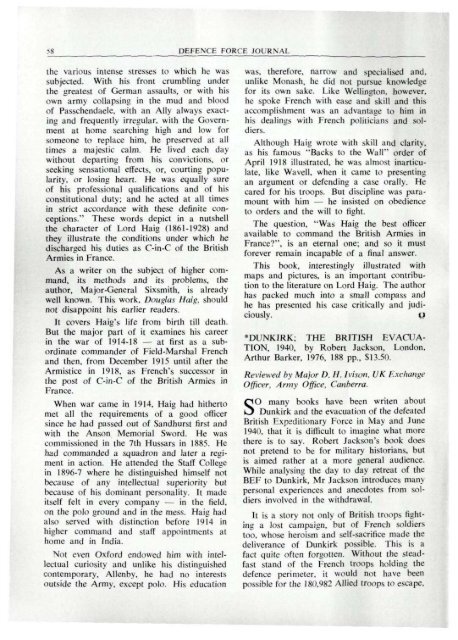ISSUE 3 : Mar/Apr - 1977 - Australian Defence Force Journal
ISSUE 3 : Mar/Apr - 1977 - Australian Defence Force Journal
ISSUE 3 : Mar/Apr - 1977 - Australian Defence Force Journal
You also want an ePaper? Increase the reach of your titles
YUMPU automatically turns print PDFs into web optimized ePapers that Google loves.
?8 DEFENCE FORCE JOURNALthe various intense stresses to which he wassubjected. With his front crumbling underthe greatest of German assaults, or with hisown army collapsing in the mud and bloodof Passchendaele. with an Ally always exactingand frequently irregular, with the Governmentat home searching high and low forsomeone to replace him, he preserved at alltimes a majestic calm. He lived each daywithout departing from his convictions, orseeking sensational effects, or, courting popularity,or losing heart. He was equally sureof his professional qualifications and of hisconstitutional duty: and he acted at all timesin strict accordance with these definite conceptions."These words depict in a nutshellthe character of Lord Haig (1861-1928) andthey illustrate the conditions under which hedischarged his duties as C-in-C of the BritishArmies in France.As a writer on the subject of higher command,its methods and its problems, theauthor. Major-General Sixsmith, is alreadywell known. This work, Douglas Haig, shouldnot disappoint his earlier readers.It covers Haig's life from birth till death.But the major part of it examines his careerin the war of 1914-18 — at first as a subordinatecommander of Field-<strong>Mar</strong>shal Frenchand then, from December 1915 until after theArmistice in 1918, as French's successor inthe post of C-in-C of the British Armies inFrance.When war came in 1914, Haig had hithertomet all the requirements of a good officersince he had passed out of Sandhurst first andwith the Anson Memorial Sword. He wascommissioned in the 7th Hussars in 1885. Hehad commanded a squadron and later a regimentin action. He attended the Staff Collegein 1896-7 where he distinguished himself notbecause of any intellectual superiority butbecause of his dominant personality. It madeitself felt in every company — in the field,on the polo ground and in the mess. Haig hadalso served with distinction before 1914 inhigher command and staff appointments athome and in India.Not even Oxford endowed him with intellectualcuriosity and unlike his distinguishedcontemporary. Allenby, he had no interestsoutside the Army, except polo. His educationwas, therefore, narrow and specialised and,unlike Monash. he did not pursue knowledgefor its own sake. Like Wellington, however,he spoke French with ease and skill and thisaccomplishment was an advantage to him inhis dealings with French politicians and soldiers.Although Haig wrote with skill and clarity,as his famous "Backs to the Wall" order of<strong>Apr</strong>il 1918 illustrated, he was almost inarticulate,like Wavell, when it came to presentingan argument or defending a case orally. Hecared for his troops. But discipline was paramountwith him — he insisted on obedienceto orders and the will to fight.The question, "Was Haig the best officeravailable to command the British Armies inFrance?", is an eternal one; and so it mustforever remain incapable of a final answer.This book, interestingly illustrated withmaps and pictures, is an important contributionto the literature on Lord Haig. The authorhas packed much into a small compass andhe has presented his case critically and judiciously,y*DUNKIRK; THE BRITISH EVACUATION, 1940, by Robert Jackson, London,Arthur Barker, 1976, 188 pp., $13.50.Reviewed by Major D. H. Ivison, UK ExchangeOfficer, Army Office, Canberra.SO many books have been writen aboutDunkirk and the evacuation of the defeatedBritish Expeditionary <strong>Force</strong> in May and June1940, that it is difficult to imagine what morethere is to say. Robert Jackson's book doesnot pretend to be for military historians, butis aimed rather at a more general audience.While analysing the day to day retreat of theBEF to Dunkirk, Mr Jackson introduces manypersonal experiences and anecdotes from soldiersinvolved in the withdrawal.It is a story not only of British troops fightinga lost campaign, but of French soldierstoo. whose heroism and self-sacrifice made thedeliverance of Dunkirk possible. This is afact quite often forgotten. Without the steadfaststand of the French troops holding thedefence perimeter, it would not have beenpossible for the 180,982 Allied troops to escape.
















